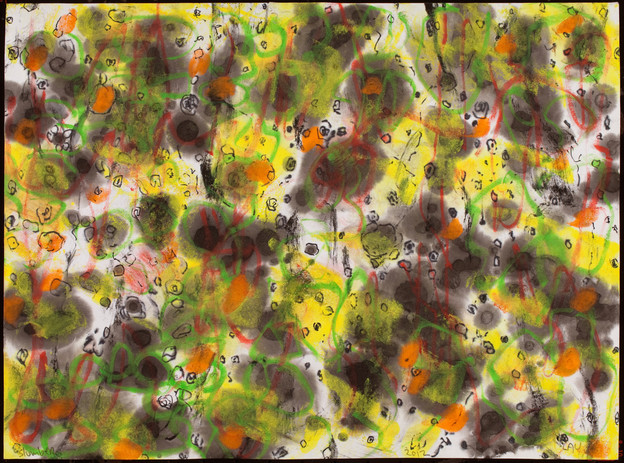Five questions for Alan Lau

For this week’s commentary, I interviewed the poet, visual artist, and editor Alan Lau. Alan has served as the arts editor for the Seattle-based Asian Pacific Islander American newspaper The International Examiner for over thirty years, curating the paper’s literary, visual, and performing arts coverage and the book review supplement the Pacific Reader.
The International Examiner was founded in 1974 as a community newspaper serving the multiethnic and multinational Asian population of Seattle’s International District, which was then contending with pressing economic and housing issues, as activists established much-needed social services in the neighborhood. Although locally focused, The International Examiner has also pioneered arts coverage for national and international Asian American artists and writers.
Alan is the author of three poetry collections: Songs for Jadina, which won the American Book Award from the Before Columbus Foundation; Blues and Greens: A Produce Worker’s Journal; and no hurry. With Lawson Fusao Inada and Garrett Hongo, he authored The Buddha Bandits Down Highway 99. His awards include fellowships from the Japan-US Friendship Commission, the National Endowment for the Arts, the Seattle Arts Commission, the California Arts Council, and the Agency for Cultural Affairs of Japan. The ArtXchange Gallery represents his visual work.
Anna Maria Hong: You’ve been the Arts Editor for The International Examiner for over thirty years. How do you choose which books of poetry to review? Has your criteria for selection changed over the years?
Alan Lau: We are a little different than mainstream newspapers and magazines where an editor will assign what he or she wants to have reviewed. We simply don’t have that kind of budget to give me as an arts editor the clout to pick what I want reviewed, and the reviewer simply reviews what he or she is assigned. Of course we do try to support local Northwest writers and I, as an editor, may have preferences, but in the end, what eventually sees the light of day on the page or online is what our volunteer writers are interested in personally and want to review.
Hong: In your opinion, what are some the most exciting developments in recent Asian American poetry and poetics?
Lau: When I was writing poetry in the late 1960s and early ’70s, I could count the number of Asian American poets who had books out on maybe my two hands. Now there are literally dozens of poets with books published, more than we have pages for to review. While I am a poet myself, and I really think it is important that poetry is represented, the arts coverage is just one part of what an Asian American community newspaper is expected to cover. What I do find exciting now is that Asian American poets can experiment and write about anything that interests them. I think, in the beginning, poets had to create a wheel first and try to roll it down the hill. Today’s poets can disassemble that wheel anyway they see fit. Anything is valid.
Hong: The International Examiner emerged out of community activism in Seattle in the 1970s and has always had a strong mission to work with local APIA communities. Which issues are prevalent in the paper’s arts coverage now?
Lau: We have such a large array of issues to cover. What people may not realize is that under the umbrella of Asian Pacific America, there are many different cultures and realities we have to try and cover, and we struggle to do a better job of covering it all. Issues of race, gender, discrimination, colonialism, genocide, stereotyping, exploitation have been around as long as we have roamed the earth, but now they have multiplied tenfold, and we have to try and cover the many ways these issues manifest themselves in today’s world.
Under the banner of arts you have literature, the performing arts, music, theatre, visual art etc. We try and spread it around and cover all the arts, but getting and keeping writers is a continual challenge at a community paper. We don’t have the financial means to keep some writers; we only publish twice a month, so it can take time to publish each article, but I think we do give people in the community a voice, a platform to air their opinions, and I think we also empower people to write and grow as writers as they go out into the world.
Hong: How has your painting and your own poetry writing intersected with your work as an arts editor? What are you working on now?
Lau: I think ever since my student days, the importance of giving something back to the community has been instilled in me. As a working artist, I feel it is important to serve the community as well as it is important to serve yourself, but the two things are not separate entities. So covering the arts for a community paper is part of the same fabric as being a working artist and writing poetry, coordinating events or painting.
Hong: What is beauty?
Lau: Beauty is something that runs deep and lies beneath the surface. Sometimes the beauty that is easily apparent and glimmers may not be a beauty that will last. Even in death, there is beauty. As much as the blossoms of the lotus are stunning in their full bloom, one can also find beauty in winter when the lotus stems are dry husks bent over in the cold.
Tweens: Asian American Poetry & Poetics in the 2010s